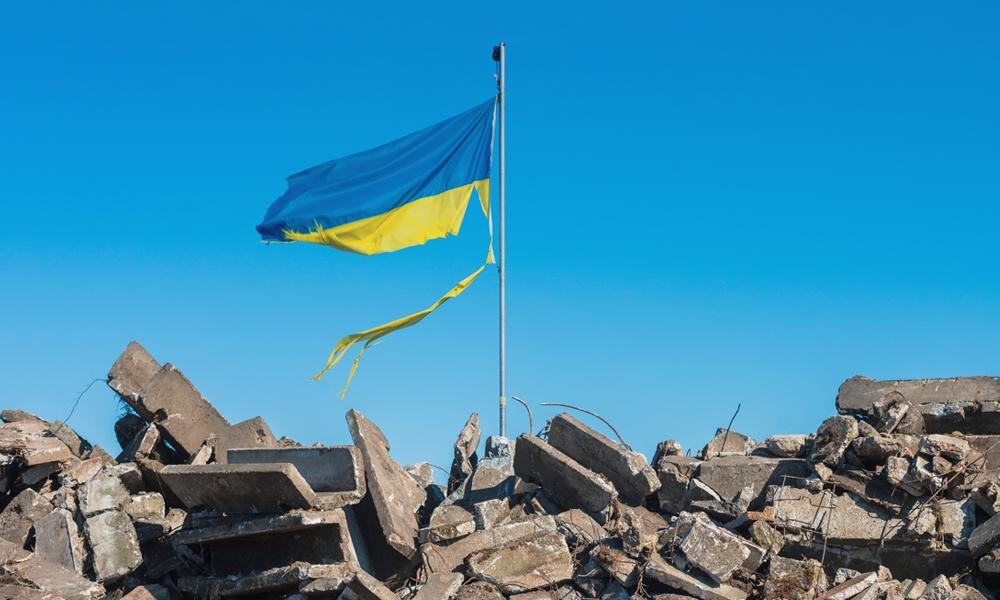Voices of war
Nation and World
SUMMARY: JMU is home to students and faculty from around the world, including Russia and Ukraine. For these members of our community, the war in Ukraine is personal. When asked how the war is affecting them, they talk of staying up late to follow the news and of losing communication with family members. They worry about their home countries while living thousands of miles away. And they urge the JMU community to stay informed and not remain silent.
“Let’s not say there are two sides to the story. There is a brutal bully, and we need to call it like this. This is Russia that bombs peaceful citizens and that does all this destruction. Let’s be honest and let’s try not to pretend. … It’s awful. For anyone, it may be hard to imagine that a country that has been living its ordinary life suddenly gets under missile strikes and shelling. If you don’t live there, it’s hard to imagine. … People in the U.S. have other interests, and I understand that. But let’s not get indifferent. Let’s not get tired. When someone needs help, people shouldn’t ignore it.”
— Sergiy Dmytriyev, assistant professor, business management and the MBA program (from Vinnytsia, Ukraine)
“As an international student from Russia, I would like to clarify that I stand with Ukraine and I am against the war. I hope that people can separate the Russian government from Russian citizens. Holding Russian nationality does not mean supporting the government. I would like to express my deepest sympathy to the people from Ukraine in this extremely difficult situation. I cannot even imagine what Ukrainians have to go through right now.
|
“I find it extremely difficult to maintain a healthy relationship with my family during this time. It really hurts to express my opinion and thoughts knowing that they would judge me.” — Irina Perfilova, graduate student |
I hope that they feel the support of those who live so far away but believe in your same ideals. … My family and friends are still in Moscow. We talk on the phone a few times a month, since there are only a few ways to communicate. I find it extremely difficult to maintain a healthy relationship with my family during this time. It really hurts to express my opinion and thoughts knowing that they would judge me. … [In Russia,] it is still illegal to name the Russia-Ukraine war as a war. According to the Russian government, the war is ‘a special military operation.’ … By blocking international news outlets and independent media and declaring journalists and organizations as ‘foreign agents,’ the Russian government is making sure that people only know what the government wants them to know. In my opinion, those actions are violating human rights. … Some Russian banks were removed from the international banking system. As a result, my Russian bank accounts are still frozen, and I do not have access to any of my personal savings.”
— Irina Perfilova, graduate student, Sport and Recreation Leadership (from Moscow, Russia)
“I have an older brother who serves in the [Ukrainian] military at this moment, and I don’t know much about what he’s doing and where he is, simply because it’s not safe for them to let others know. … I remember one night when everybody went to bed, and I was checking the news. It was morning in Ukraine, and they were reporting explosions and rocket attacks. I called my parents in Canada and said, ‘Well, the worst became worse.’ … I would say this is a genocidal, imperialist war that is a product of the entire history of Russia. On the one hand, you can say, ‘Well, it’s just the last 20 years that led to the war.’ On the other hand, it’s the last 500 or 600 years.”
— Dmytro Babik, assistant professor, computer information systems and business analytics (from Kharkiv, Ukraine)
“Growing up, I lived both in Moscow, Russia, and Odessa, Ukraine, as my family is international. Traveling to Ukraine is very unsafe these days; anything can happen on the road. The beautiful and modern airport in Odessa has been destroyed.
|
“We are managing lots of things from overseas, and it is extremely stressful, especially when my grandma [in Ukraine] gets sick. It is critical to be next to your dearest person when she needs you and gets old.” — Katya Lukyanchikova, junior |
We are praying for all the people of Ukraine and all Ukrainian cities to be safe. … The majority of the people living in Russia do not wish for this war; some people are being misinformed by the mass media and misinterpret the invasion as an attempt to protect their own land. My life and my mom’s life have been affected dramatically. My mom was born in Ukraine, but now she has a Russian passport. She is not welcome in her home country of Ukraine anymore, as any Russian citizen is associated with the enemy and a potential terrorist. We are managing lots of things from overseas, and it is extremely stressful, especially when my grandma [in Ukraine] gets sick. It is critical to be next to your dearest person when she needs you and gets old. … Most of our friends had to leave Ukraine and found refuge across the globe. They are starting their life from scratch, going through colossal challenges and adjustments, learning to live in a new environment, and missing their home country and life before the war tremendously.”
— Katya Lukyanchikova, junior, Business Management (from Moscow, Russia, and Odessa, Ukraine)

